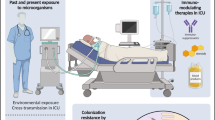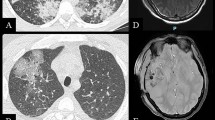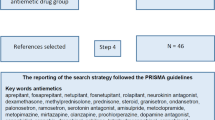Abstract
Purpose of review
Bacterial sepsis is a leading cause of morbidity and mortality among pediatric cancer patients receiving intensive chemotherapy. While there are treatment guidelines for empiric antimicrobial therapy for fever with neutropenia, the role of prophylactic antibacterial agents has been widely debated and is less well-defined.
Recent findings
Demonstrable benefits of fluoroquinolone prophylaxis (specifically levofloxacin) include prevention of bacteremia and potentially fevers during neutropenia, though with limited if any impact on mortality. However, the risks of using antibacterial prophylaxis include antimicrobial over-utilization, antimicrobial resistance, Clostridioides difficile colitis, and stool dysbiosis with associated risk of graft versus host disease and mortality.
Summary
This review article outlines the current literature and provides guidance for decisions about levofloxacin prophylaxis in the pediatric oncology population.
Similar content being viewed by others
References and Recommended Reading
Papers of particular interest, published recently, have been highlighted as: • Of importance •• Of major importance
Phelan R, Arora, M., Chen, M. Current use and outcome of hematopoietic stem cell transplantation: CIBMTR US summary slides 2020. Available from: https://www.cibmtr.org/ReferenceCenter/SlidesReports/SummarySlides/pages/index.aspx.
Fiser RT, West NK, Bush AJ, Sillos EM, Schmidt JE, Tamburro RF. Outcome of severe sepsis in pediatric oncology patients. Pediatric critical care medicine : a journal of the Society of Critical Care Medicine and the World Federation of Pediatric Intensive and Critical Care Societies. 2005;6(5):531–6.
Wicki S, Keisker A, Aebi C, Leibundgut K, Hirt A, Ammann RA. Risk prediction of fever in neutropenia in children with cancer: a step towards individually tailored supportive therapy? Pediatr Blood Cancer. 2008;51(6):778–83.
Castagnola E, Boni L, Giacchino M, et al. A multicenter, randomized, double blind placebo-controlled trial of amoxicillin/clavulanate for the prophylaxis of fever and infection in neutropenic children with cancer. Pediatr Infect Dis J. 2003;22:359–65.
Swartz M. Impact of antimicrobial agents and chemotherapy from 1972 to 1998. Antimicrob Agents Chemother. 2000;44:2009–16.
Schaad UB. Will fluoroquinolones ever be recommended for common infections in children? Pediatr Infect Dis J. 2007;26(10):865–7.
Lew MA, Kehoe K, Ritz J, Antman KH, Nadler L, Kalish LA, Finberg R. Ciprofloxacin versus trimethoprim/sulfamethoxazole for prophylaxis of bacterial infections in bone marrow transplant recipients: a randomized, controlled trial. J Clin Oncol. 1995;13:239–50.
D’Antonio D, Piccolomini R, Iacone A, et al. Comparison of ciprofloxacin, ofloxacin and pefloxacin for the prevention of the bacterial infection in neutropenic patients with haematological malignancies. J Antimicrob Chemother. 1994;33:837–44.
Lighter-Fisher J, Stanley K, Phillips M, Pham V, Klejmont LM. Preventing infections in children with cancer. Pediatr Rev. 2016;37(6):247–58.
Sung L, Lange BJ, Gerbing RB, Alonzo TA, Feusner J. Microbiologically documented infections and infection-related mortality in children with acute myeloid leukemia. Blood. 2007;110(10):3532–9.
Vento S, Cainelli F. Infections in patients with cancer undergoing chemotherapy: aetiology, prevention, and treatment. Lancet Oncol. 2003;4(10):595–604.
Hammond SP, Baden LR. Antibiotic prophylaxis for patients with acute leukemia. Leuk Lymphoma. 2008;49(2):183–93.
• Patel B, Noda A, Godbout E, Stevens M, Noda C. Levofloxacin for antibacterial prophylaxis in pediatric patients with acute myeloid leukemia or undergoing hematopoietic stem cell transplantation. J Pediatr Pharmacol Ther. 2020;25(7):629–35. (Levofloxacin is an equally appropriate choice to other prophylactic antibiotics used in pediatric AML and bone marrow transplant patients.)
Cecinati V, Principi N, Brescia L, Esposito S. Antibiotic prophylaxis in children with cancer or who have undergone hematopoietic cell transplantation. European journal of clinical microbiology & infectious diseases : official publication of the European Society of Clinical Microbiology. 2014;33(1):1–6.
Hughes WT, Armstrong D, Bodey GP, Bow EJ, Brown AE, Calandra T, et al. 2002 guidelines for the use of antimicrobial agents in neutropenic patients with cancer. Clin Infect Dis. 2002;34(6):730–51.
Sung L, Buxton A, Gamis A, Woods WG, Alonzo TA. Life-threatening and fatal infections in children with acute myeloid leukemia: a report from the Children’s Oncology Group. J Pediatr Hematol Oncol. 2012;34(1):e30–5.
Inaba H, Pei D, Wolf J, Howard SC, Hayden RT, Go M, et al. Infection-related complications during treatment for childhood acute lymphoblastic leukemia. Ann Oncol. 2017;28(2):386–92.
Raetz EA, Borowitz MJ, Devidas M, Linda SB, Hunger SP, Winick NJ, et al. Reinduction platform for children with first marrow relapse of acute lymphoblastic leukemia: a Children’s Oncology Group Study[corrected]. J Clin Oncol. 2008;26(24):3971–8.
Lehrnbecher T, Ethier MC, Zaoutis T, Creutzig U, Gamis A, Reinhardt D, et al. International variations in infection supportive care practices for paediatric patients with acute myeloid leukaemia. Br J Haematol. 2009;147(1):125–8.
•• Lehrnbecher T, Fisher BT, Phillips B, Alexander S, Ammann RA, Beauchemin M, et al. Guideline for antibacterial prophylaxis administration in pediatric cancer and hematopoietic stem cell transplantation. Clin Infect Dis. 2020;71(1):226–36. (This systemic review uses the results of 114 randomized trials evaluating antibiotic prophylaxis to provide clinical practice guidelines for pediatric cancer and HSCT patients.)
Engels EA, Lau J, Barza M. Efficacy of quinolone prophylaxis in neutropenic cancer patients: a meta-analysis. J Clin Oncol. 1998;16(3):1179–87.
Cruciani M, Rampazzo R, Malena M, Lazzarini L, Todeschini G, Messori A, et al. Prophylaxis with fluoroquinolones for bacterial infections in neutropenic patients: a meta-analysis. Clin Infect Dis. 1996;23(4):795–805.
• Mikulska M, Averbuch D, Tissot F, Cordonnier C, Akova M, Calandra T, et al. Fluoroquinolone prophylaxis in haematological cancer patients with neutropenia: ECIL critical appraisal of previous guidelines. J Infect. 2018;76(1):20–37. (Adult literature review of 2 randomized controlled trials and 12 observational trials, showing a possible decrease in the incidence of blood stream infections but no change in overall mortality.)
Gafter-Gvili A, Fraser A, Paul M, Leibovici L. Meta-analysis: antibiotic prophylaxis reduces mortality in neutropenic patients. Ann Intern Med. 2005;142(12 Pt 1):979–95.
Kimura S, Akahoshi Y, Nakano H, Ugai T, Wada H, Yamasaki R, et al. Antibiotic prophylaxis in hematopoietic stem cell transplantation. A meta-analysis of randomized controlled trials. The Journal of infection. 2014;69(1):13–25.
Bucaneve G, Micozzi A, Menichetti F, Martino P, Dionisi MS, Martinelli G, et al. Levofloxacin to prevent bacterial infection in patients with cancer and neutropenia. N Engl J Med. 2005;353(10):977–87.
Wisplinghoff H, Seifert H, Wenzel RP, Edmond MB. Current trends in the epidemiology of nosocomial bloodstream infections in patients with hematological malignancies and solid neoplasms in hospitals in the United States. Clin Infect Dis. 2003;36(9):1103–10.
Edlund C, Nord CE. Effect of quinolones on intestinal ecology. Drugs. 1999;58(Suppl 2):65–70.
Timmers GJ, Dijstelbloem Y, Simoons-Smit AM, van Winkelhoff AJ, Touw DJ, Vandenbroucke-Grauls CM, et al. Pharmacokinetics and effects on bowel and throat microflora of oral levofloxacin as antibacterial prophylaxis in neutropenic patients with haematological malignancies. Bone Marrow Transplant. 2004;33(8):847–53.
Wolf J, Tang L, Flynn PM, Pui CH, Gaur AH, Sun Y, et al. Levofloxacin prophylaxis during induction therapy for pediatric acute lymphoblastic leukemia. Clin Infect Dis. 2017;65(11):1790–8.
Kurt B, Flynn P, Shenep JL, Pounds S, Lensing S, Ribeiro RC, et al. Prophylactic antibiotics reduce morbidity due to septicemia during intensive treatment for pediatric acute myeloid leukemia. Cancer. 2008;113(2):376–82.
Yousef AA, Fryer CJ, Chedid FD, Abbas AA, Felimban SK, Khattab TM. A pilot study of prophylactic ciprofloxacin during delayed intensification in children with acute lymphoblastic leukemia. Pediatr Blood Cancer. 2004;43(6):637–43.
Sulis ML, Blonquist TM, Stevenson KE, Hunt SK, Kay-Green S, Athale UH, et al. Effectiveness of antibacterial prophylaxis during induction chemotherapy in children with acute lymphoblastic leukemia. Pediatr Blood Cancer. 2018;65(5): e26952.
Hafez HA, Yousif D, Abbassi M, Elborai Y, Elhaddad A. Prophylactic levofloxacin in pediatric neutropenic patients during autologous hematopoietic stem cell transplantation. Clin Transplant. 2015;29(12):1112–8.
Alexander S, Fisher BT, Gaur AH, Dvorak CC, Villa Luna D, Dang H, et al. Effect of levofloxacin prophylaxis on bacteremia in children with acute leukemia or undergoing hematopoietic stem cell transplantation: a randomized clinical trial. JAMA. 2018;320(10):995–1004.
Maser B, Pelland-Marcotte MC, Alexander S, Sung L, Gupta S. Levofloxacin prophylaxis in hospitalized children with leukemia: a cost-utility analysis. Pediatr Blood Cancer. 2020;67(10): e28643.
McCormick M, Friehling E, Kalpatthi R, Siripong N, Smith K. Cost-effectiveness of levofloxacin prophylaxis against bacterial infection in pediatric patients with acute myeloid leukemia. Pediatr Blood Cancer. 2020;67(10): e28469.
Cullen M, Steven N, Billingham L, Gaunt C, Hastings M, Simmonds P, et al. Antibacterial prophylaxis after chemotherapy for solid tumors and lymphomas. N Engl J Med. 2005;353(10):988–98.
Alexander S, Nieder M, Zerr DM, Fisher BT, Dvorak CC, Sung L. Prevention of bacterial infection in pediatric oncology: what do we know, what can we learn? Pediatr Blood Cancer. 2012;59(1):16–20.
Bow EJ. Fluoroquinolones, antimicrobial resistance and neutropenic cancer patients. Curr Opin Infect Dis. 2011;24(6):545–53.
Schimpff SC, Young VM, Greene WH, Vermeulen GD, Moody MR, Wiernik PH. Origin of infection in acute nonlymphocytic leukemia. Significance of hospital acquisition of potential pathogens. Ann Intern Med. 1972;77(5):707–14.
Tancrède CH, Andremont AO. Bacterial translocation and gram-negative bacteremia in patients with hematological malignancies. J Infect Dis. 1985;152(1):99–103.
Nijssen S, Fluit A, van de Vijver D, Top J, Willems R, Bonten MJ. Effects of reducing beta-lactam antibiotic pressure on intestinal colonization of antibiotic-resistant gram-negative bacteria. Intensive Care Med. 2010;36(3):512–9.
Miles-Jay A, Butler-Wu S, Rowhani-Rahbar A, Pergam SA. Incidence rate of fluoroquinolone-resistant gram-negative rod bacteremia among allogeneic hematopoietic cell transplantation patients during an era of levofloxacin prophylaxis. Biology of blood and marrow transplantation : journal of the American Society for Blood and Marrow Transplantation. 2015;21(3):539–45.
Averbuch D, Tridello G, Hoek J, Mikulska M, Akan H, Yanez San Segundo L, et al. Antimicrobial resistance in Gram-negative rods causing bacteremia in hematopoietic stem cell transplant recipients: intercontinental prospective study of the Infectious Diseases Working Party of the European Bone Marrow Transplantation Group. Clin Infect Dis. 2017;65(11):1819–28.
Wisplinghoff H, Bischoff T, Tallent SM, Seifert H, Wenzel RP, Edmond MB. Nosocomial bloodstream infections in US hospitals: analysis of 24,179 cases from a prospective nationwide surveillance study. Clin Infect Dis. 2004;39(3):309–17.
Razonable RR, Litzow MR, Khaliq Y, Piper KE, Rouse MS, Patel R. Bacteremia due to viridans group Streptococci with diminished susceptibility to Levofloxacin among neutropenic patients receiving levofloxacin prophylaxis. Clin Infect Dis. 2002;34(11):1469–74.
Matar MJ, Tarrand J, Raad I, Rolston KV. Colonization and infection with vancomycin-resistant Enterococcus among patients with cancer. Am J Infect Control. 2006;34(8):534–6.
Edmond MB, Ober JF, Weinbaum DL, Pfaller MA, Hwang T, Sanford MD, et al. Vancomycin-resistant Enterococcus faecium bacteremia: risk factors for infection. Clin Infect Dis. 1995;20(5):1126–33.
Kim J, Smathers SA, Prasad P, Leckerman KH, Coffin S, Zaoutis T. Epidemiological features of Clostridium difficile-associated disease among inpatients at children’s hospitals in the United States, 2001–2006. Pediatrics. 2008;122(6):1266–70.
Sammons JS, Localio R, Xiao R, Coffin SE, Zaoutis T. Clostridium difficile infection is associated with increased risk of death and prolonged hospitalization in children. Clin Infect Dis. 2013;57(1):1–8.
Owens RC Jr, Ambrose PG. Antimicrobial safety: focus on fluoroquinolones. Clin Infect Dis. 2005;41(Suppl 2):S144–57.
Sullivan A, Edlund C, Nord CE. Effect of antimicrobial agents on the ecological balance of human microflora. Lancet Infect Dis. 2001;1(2):101–14.
Buffie CG, Bucci V, Stein RR, McKenney PT, Ling L, Gobourne A, et al. Precision microbiome reconstitution restores bile acid mediated resistance to Clostridium difficile. Nature. 2015;517(7533):205–8.
von Baum H, Sigge A, Bommer M, Kern WV, Marre R, Döhner H, et al. Moxifloxacin prophylaxis in neutropenic patients. J Antimicrob Chemother. 2006;58(4):891–4.
Taur Y, Xavier JB, Lipuma L, Ubeda C, Goldberg J, Gobourne A, et al. Intestinal domination and the risk of bacteremia in patients undergoing allogeneic hematopoietic stem cell transplantation. Clin Infect Dis. 2012;55(7):905–14.
Rashidi A, Kaiser T, Graiziger C, Holtan SG, Rehman TU, Weisdorf DJ, et al. Specific gut microbiota changes heralding bloodstream infection and neutropenic fever during intensive chemotherapy. Leukemia. 2020;34(1):312–6.
Ubeda C, Taur Y, Jenq RR, Equinda MJ, Son T, Samstein M, et al. Vancomycin-resistant Enterococcus domination of intestinal microbiota is enabled by antibiotic treatment in mice and precedes bloodstream invasion in humans. J Clin Invest. 2010;120(12):4332–41.
Rashidi A, Kaiser T, Graiziger C, Holtan SG, Rehman TU, Weisdorf DJ, et al. Gut dysbiosis during antileukemia chemotherapy versus allogeneic hematopoietic cell transplantation. Cancer. 2020;126(7):1434–47.
Galloway-Peña JR, Shi Y, Peterson CB, Sahasrabhojane P, Gopalakrishnan V, Brumlow CE, et al. Gut microbiome signatures are predictive of infectious risk following induction therapy for acute myeloid leukemia. Clin Infect Dis. 2020;71(1):63–71.
Shono Y, Docampo MD, Peled JU, Perobelli SM, Velardi E, Tsai JJ, et al. Increased GVHD-related mortality with broad-spectrum antibiotic use after allogeneic hematopoietic stem cell transplantation in human patients and mice. Sci Transl Med. 2016;8(339):339ra71.
Rashidi A, Maeser D, Kaiser T, Ebadi M, Rehman TU, Holtan SG, et al. Microbiome swings with repeated insults. Br J Haematol. 2020;189(3):e94–6.
Bhattacharyya A, Hanafi LA, Sheih A, Golob JL, Srinivasan S, Boeckh MJ, et al. Graft-derived reconstitution of mucosal-associated invariant T cells after allogeneic hematopoietic cell transplantation. Biology of blood and marrow transplantation : journal of the American Society for Blood and Marrow Transplantation. 2018;24(2):242–51.
Taur Y, Jenq RR, Perales MA, Littmann ER, Morjaria S, Ling L, et al. The effects of intestinal tract bacterial diversity on mortality following allogeneic hematopoietic stem cell transplantation. Blood. 2014;124(7):1174–82.
Peled JU, Gomes ALC, van den Brink MRM. Microbiota and allogeneic hematopoietic-cell transplantation. Reply N Engl J Med. 2020;382(24):2378–9.
Golob JL, Pergam SA, Srinivasan S, Fiedler TL, Liu C, Garcia K, et al. Stool microbiota at neutrophil recovery is predictive for severe acute graft vs host disease after hematopoietic cell transplantation. Clin Infect Dis. 2017;65(12):1984–91.
Burkhardt JE, Walterspiel JN, Schaad UB. Quinolone arthropathy in animals versus children. Clin Infect Dis. 1997;25(5):1196–204.
Thursky K, Lingaratnam S, Jayarajan J, Haeusler GM, Teh B, Tew M, et al. Implementation of a whole of hospital sepsis clinical pathway in a cancer hospital: impact on sepsis management, outcomes and costs. BMJ Open Qual. 2018;7(3): e000355.
Slavin MA, Lingaratnam S, Mileshkin L, Booth DL, Cain MJ, Ritchie DS, et al. Use of antibacterial prophylaxis for patients with neutropenia. Australian Consensus Guidelines 2011 Steering Committee. Intern Med J. 2011;41(1b):102–9.
Murphy M, Brown AE, Sepkowitz KA, Bernard EM, Kiehn TE, Armstrong D. Fluoroquinolone prophylaxis for the prevention of bacterial infections in patients with cancer–is it justified? Clin Infect Dis. 1997;25(2):346–8.
Freifeld AG, Sepkowitz KA, Martino P, Steven N, Billingham L, Cullen M, et al. Antibacterial prophylaxis in patients with cancer and neutropenia. N Engl J Med. 2006;354(1):90–4; author reply -4.
Kleinberg M. Counterpoint: routine anti-bacterial prophylaxis is not indicated in neutropenic patients with hematological malignancies. J Natl Compr Canc Netw. 2004;2(5):445–51.
Bow EJ. Point: fluoroquinolone-based antibacterial chemoprophylaxis in neutropenic cancer patients works for defined outcomes in defined populations, but must be used wisely. J Natl Compr Canc Netw. 2004;2(5):433–44.
Freifeld AG, Bow EJ, Sepkowitz KA, Boeckh MJ, Ito JI, Mullen CA, et al. Clinical practice guideline for the use of antimicrobial agents in neutropenic patients with cancer: 2010 update by the infectious diseases society of america. Clin Infect Dis. 2011;52(4):e56-93.
•• Lehrnbecher T, Averbuch D, Castagnola E, Cesaro S, Ammann RA, Garcia-Vidal C, et al. 8th European Conference on Infections in Leukaemia: 2020 guidelines for the use of antibiotics in paediatric patients with cancer or post-haematopoietic cell transplantation. The Lancet Oncology. 2021;22(6):e270-e80. (This article reports the pediatric recommendations provided by the 8th European Conference on Infections in Leukaemia (ECIL-8), based on their review of pertinent literature.)
Rashidi A, Wangjam T, Bhatt AS, Weisdorf DJ, Holtan SG. Antibiotic practice patterns in hematopoietic cell transplantation: a survey of blood and marrow transplant clinical trials network centers. Am J Hematol. 2018;93(11):E348–50.
Falcon CP, Broglie L, Phelan R, Choi SW, Auletta JJ, Chewning JH. Infection prophylaxis patterns following pediatric autologous hematopoietic stem cell transplantation: a survey of Pediatric Transplant and Cell Therapy Consortium centers. Pediatr Transplant. 2020;24(8): e13821.
•• Taplitz RA, Kennedy EB, Bow EJ, Crews J, Gleason C, Hawley DK, et al. Antimicrobial prophylaxis for adult patients with cancer-related immunosuppression: ASCO and IDSA Clinical Practice Guideline Update. J Clin Oncol. 2018;36(30):3043–54. (A systemic review of relevant adult studies over a 5-year period was evaluated by both ASCO and IDSA. They ultimately recommended antibacterial prophylaxis for patients at high risk for infection, meaning those with expected periods of profound neutropenia with ANC <100 neutrophils/mL for 7 days or greater.)
• Slavin MA, Worth LJ, Seymour JF, Thursky KA. Better sepsis management rather than fluoroquinolone prophylaxis for patients with cancer-related immunosuppression. J Clin Oncol. 2019;37(13):1139–40. (Letter to the editor, addressing adult prophylaxis guidelines reported by Taplitz et al (see above). They disagree with the proposed levofloxacin prophylaxis guidelines and instead stress the importance of improved sepsis recognition and management by clinicians to impact mortality.)
Taplitz RA, Kennedy EB, Flowers CR. Reply to M.A. Slavin et al. J Clin Oncol. 2019;37(13):1140–1.
Neumann S, Krause SW, Maschmeyer G, Schiel X, von Lilienfeld-Toal M. Primary prophylaxis of bacterial infections and Pneumocystis jirovecii pneumonia in patients with hematological malignancies and solid tumors : guidelines of the Infectious Diseases Working Party (AGIHO) of the German Society of Hematology and Oncology (DGHO). Ann Hematol. 2013;92(4):433–42.
Author information
Authors and Affiliations
Corresponding author
Ethics declarations
Conflict of interest
Amanda Scheuermann declares that she has no conflict of interest.
Anna R. Huppler declares that she has no conflict of interest.
Michelle Mitchell declares that she has no conflict of interest.
Jaime S. Green declares that she has no conflict of interest.
Additional information
Publisher's Note
Springer Nature remains neutral with regard to jurisdictional claims in published maps and institutional affiliations.
This article is part of the Topical Collection on Pediatric Infectious Disease.
Rights and permissions
About this article
Cite this article
Scheuermann, A., Huppler, A.R., Mitchell, M. et al. Review: Levofloxacin Prophylaxis in Pediatric Oncology Patients. Curr Treat Options Peds 8, 211–231 (2022). https://doi.org/10.1007/s40746-022-00251-0
Accepted:
Published:
Issue Date:
DOI: https://doi.org/10.1007/s40746-022-00251-0




